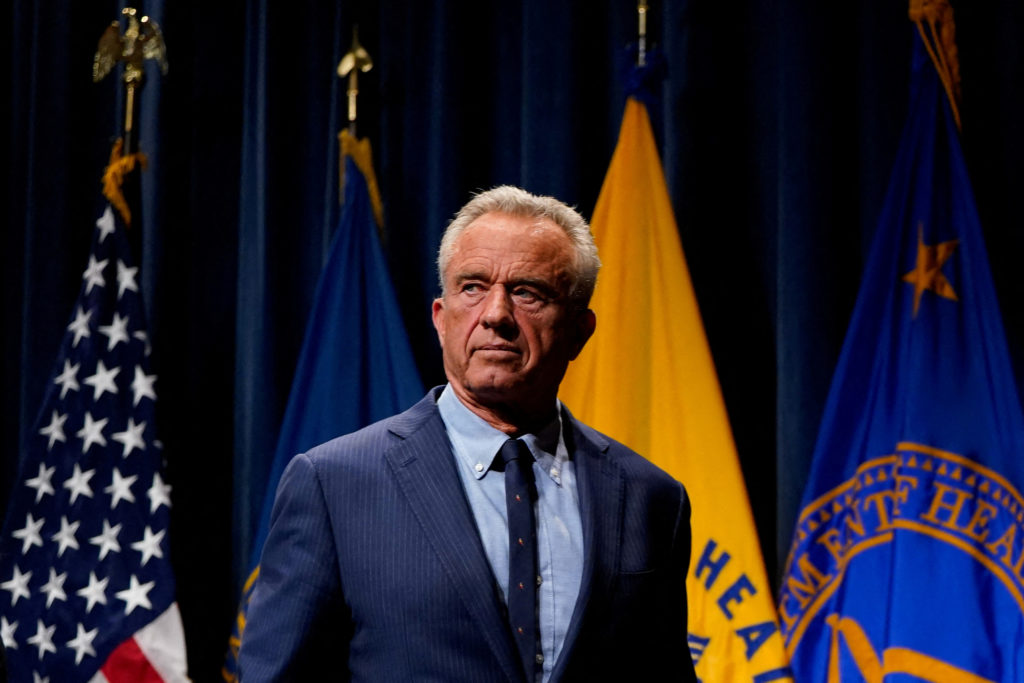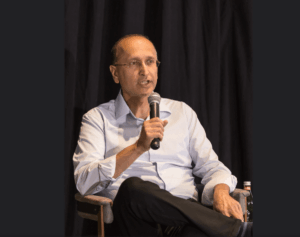
FILE PHOTO: U.S. Health and Human Services (HHS) Secretary Robert F. Kennedy, Jr. leaves the stage after discussing the findings of the Centers for Disease Control and Prevention’s (CDC) latest Autism and Developmental Disabilities Monitoring (ADDM) Network survey, at the Department of Health and Human Services in Washington, D.C., U.S., April 16, 2025. REUTERS/Elizabeth Frantz/File Photo
NEW YORK (AP) — In a surprising move, U.S. Health Secretary Robert F. Kennedy Jr. announced on Wednesday the appointment of eight new vaccine policy advisers, replacing the previously dismissed panel. Among the new appointees is a scientist known for his criticisms of COVID-19 vaccines, alongside other figures who have been vocal about pandemic policies.
The announcement follows Kennedy’s decision to “retire” the previous 17-member Advisory Committee on Immunization Practices (ACIP), a move that has drawn criticism from medical professionals and public health organizations. Concerns have been raised that the new panel may align more closely with Kennedy’s skepticism towards existing vaccination protocols.
Controversial Appointments
Among the new advisers is Dr. Robert Malone, a former mRNA researcher who gained attention during the COVID-19 pandemic for promoting conspiracy theories about vaccines. Malone has been a vocal critic, suggesting that COVID-19 vaccines could cause severe health issues, a claim widely discredited by scientific communities.
Another notable appointee is Dr. Martin Kulldorff, co-author of the Great Barrington Declaration, which argued against pandemic lockdowns. The declaration was criticized for downplaying the severity of COVID-19 and advocating for herd immunity without vaccines.
Vicky Pebsworth, associated with the National Vaccine Information Center, a group known for spreading vaccine misinformation, has also been named to the panel. These appointments have raised eyebrows among experts who worry about the potential impact on public health policies.
Background and Reactions
The ACIP, established in 1964, plays a crucial role in guiding the Centers for Disease Control and Prevention (CDC) on vaccine usage. Historically, the CDC has adopted the committee’s recommendations, which significantly influence national vaccination programs.
Kennedy’s decision to overhaul the committee comes amidst his broader agenda to reassess childhood vaccines. Despite assurances during his Senate confirmation that he would not alter the vaccination schedule, Kennedy has since pursued changes, including the controversial decision to alter COVID-19 vaccination recommendations for children and pregnant women.
Jason Schwartz, a health policy researcher at Yale University, commented on the situation, stating,
“If you are to exclude any reputable, respected vaccine expert who has ever engaged even in a limited way with the vaccine industry, you’re likely to have a very small pool of folks to draw from.”
Implications and Future Steps
The implications of Kennedy’s appointments are significant. The ACIP’s recommendations are pivotal in shaping public health policy, and the new panel’s stance could lead to shifts in vaccination strategies. The upcoming meeting in June, where votes on vaccines for flu, COVID-19, HPV, RSV, and meningococcal bacteria are expected, will be closely watched.
As the health community grapples with these changes, the broader public health implications remain uncertain. The potential for increased vaccine hesitancy and misinformation looms large, raising questions about the future of vaccination efforts in the U.S.
While a spokesperson for the Department of Health and Human Services has not clarified whether additional members will be appointed, the current composition of the panel suggests a significant shift in the advisory process. As the situation unfolds, stakeholders across the health sector will be monitoring developments closely.
Associated Press reporters Matthew Perrone, Amanda Seitz, Devi Shastri, and Laura Ungar contributed to this report.






